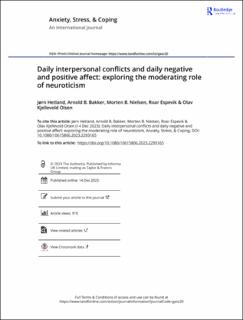| dc.contributor.author | Hetland, Jørn | |
| dc.contributor.author | Bakker, Arnold B. | |
| dc.contributor.author | Nielsen, Morten Birkeland | |
| dc.contributor.author | Espevik, Roar | |
| dc.contributor.author | Olsen, Olav Kjellevold | |
| dc.date.accessioned | 2024-02-08T08:46:56Z | |
| dc.date.available | 2024-02-08T08:46:56Z | |
| dc.date.created | 2023-12-15T13:00:46Z | |
| dc.date.issued | 2023 | |
| dc.identifier.issn | 1061-5806 | |
| dc.identifier.uri | https://hdl.handle.net/11250/3116299 | |
| dc.description.abstract | Background and Objectives Drawing on affective events theory, the present study investigates relationships between daily interpersonal conflicts and negative and positive affective reactions, and tested whether trait neuroticism moderates immediate (same day) and persisting (next-day) affective reactions. Design and Methods A sample of 53 Norwegian naval cadets completed a diary questionnaire for 30 consecutive days (total N = 1590). Results As predicted, the findings showed that cadets reported more negative affect (but not less positive affect) on days they were confronted with affective events that were of a conflicting nature. In addition, the proposed interaction effects between daily conflict and neuroticism were significant for both negative and positive affect. Specifically, the immediate and persistent effects of daily conflicts on negative affect were strongest for individuals high (vs. low) in neuroticism. Moreover, individuals high in neuroticism reported less positive affect on days with conflicts, whereas individuals low in neuroticism reported more positive affect the two days following interpersonal conflicts. Conclusions The findings contribute to affective events theory with important knowledge about the role of trait neuroticism in dealing with interpersonal conflicts in a natural work setting. | |
| dc.description.abstract | Daily interpersonal conflicts and daily negative and positive affect: exploring the moderating role of neuroticism | |
| dc.language.iso | eng | |
| dc.title | Daily interpersonal conflicts and daily negative and positive affect: exploring the moderating role of neuroticism | |
| dc.title.alternative | Daily interpersonal conflicts and daily negative and positive affect: exploring the moderating role of neuroticism | |
| dc.type | Peer reviewed | |
| dc.type | Journal article | |
| dc.description.version | publishedVersion | |
| dc.source.journal | Anxiety, Stress, & Coping | |
| dc.identifier.doi | 10.1080/10615806.2023.2293165 | |
| dc.identifier.cristin | 2214147 | |
| cristin.ispublished | true | |
| cristin.fulltext | original | |
| cristin.qualitycode | 1 | |
